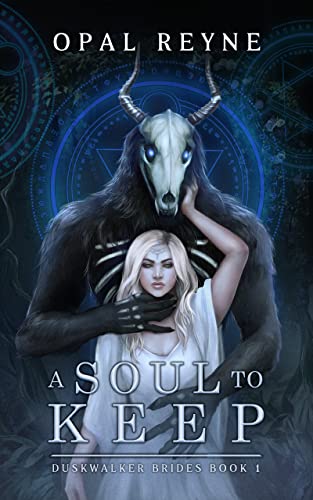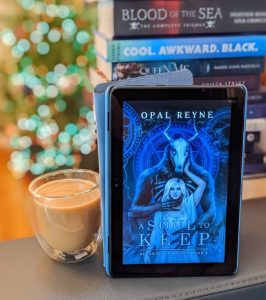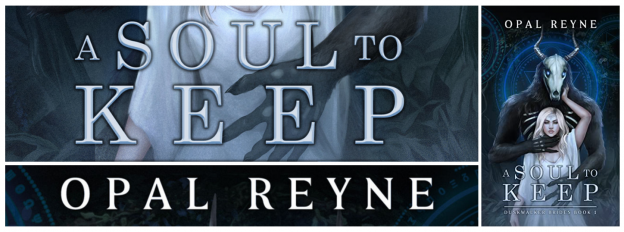I purchased an e-copy of A Soul to Keep, by Opal Reyne.

All Reia ever wanted was freedom.
Known as a harbinger of bad omens and blamed for Demons eating her family, Reia is shunned by her entire village. When the next offering is due and the monstrous Duskwalker is seen heading their way, her village offers her an impossible choice – be thrown into the prison cells or allow herself to be sacrificed to a faceless monster.
However, he is not what he seems. His skull face and glow eyes are ethereal, and she finds herself unwittingly enchanted by him.
All Orpheus ever wanted was a companion.
Each decade, in exchange for a protection ward from the Demons that terrorise the world, Orpheus takes a human offering to the Veil – the place he lives and the home of Demons. The brief companionship does little to ease his loneliness, and their lives were always, unfortunately, cut short.
He’d thought it was a hopeless endeavour, until he met her. She’s not afraid of him, and his insatiable desire deepens within every moment of her presence.
But will Orpheus be able to convince Reia to stay before she’s lost to him forever?

I enjoyed this, though it won’t top any favorites lists for me. I thought the world interesting, as well as the way Duskwalkers (and maybe demons) could craft themselves. I appreciated that Reia had a backbone and was the initiator of most of the sexual progress in the relationship.
I also thought Orpheus was adorable. He was super sweet, if a bit of a doormat. (Though I don’t think the reader is supposed to interpret it that way.) There is definitely some Himbo energy there. But it takes a lot of suspension of disbelief to overlook both that Orpheus eats people and takes people as sacrifices and still see him as the hero.
My main problem, personally, was the sex. I’m all about the monster sex, don’t get me wrong. And the sex was hot, not gonna lie. But it felt very much like it was written to match the trends of what is popular in spicy romance today, and, frankly, a lot of what Orpheus said/did/thought during sex didn’t actually fit him, the character as written. Sex-scene-Orpheus and rest-of-the-book-Orpheus felt like different characters. So, there was a disconnect for me.
I also thought the book could do with one more mechanical editing pass. There were several  instances of missing or misused words. No, I don’t mean because it’s Australian English. But I’d occasionally be pulled out of the narrative to figure out what word was missing from a sentence to make it make sense (it was usually an article or pronoun) or if the author actually meant the sentence to include same or some because it said, “same some” and only one or the other would make sense (that sort of thing).
instances of missing or misused words. No, I don’t mean because it’s Australian English. But I’d occasionally be pulled out of the narrative to figure out what word was missing from a sentence to make it make sense (it was usually an article or pronoun) or if the author actually meant the sentence to include same or some because it said, “same some” and only one or the other would make sense (that sort of thing).
All in all, though, I enjoyed more about the book than I didn’t and will likely read book two at some point.
Other Reviews:
